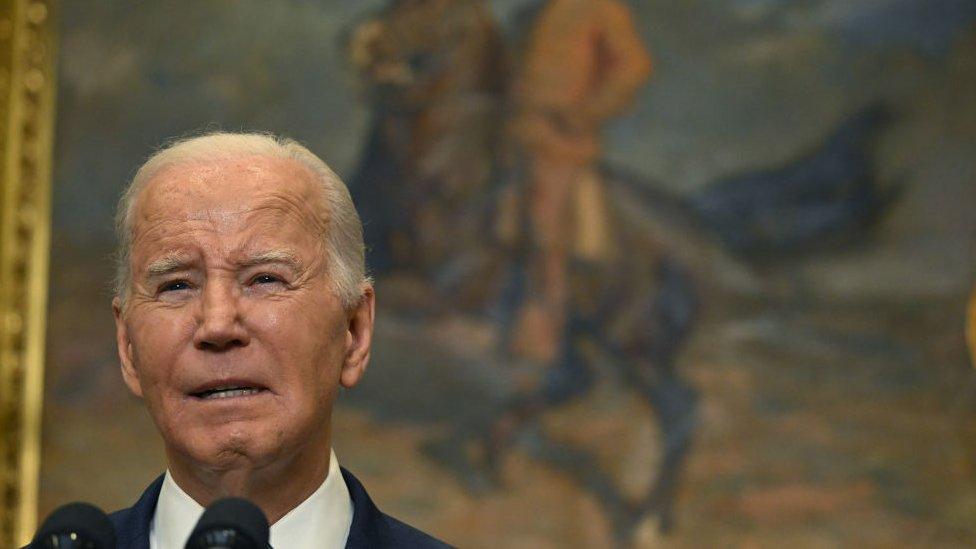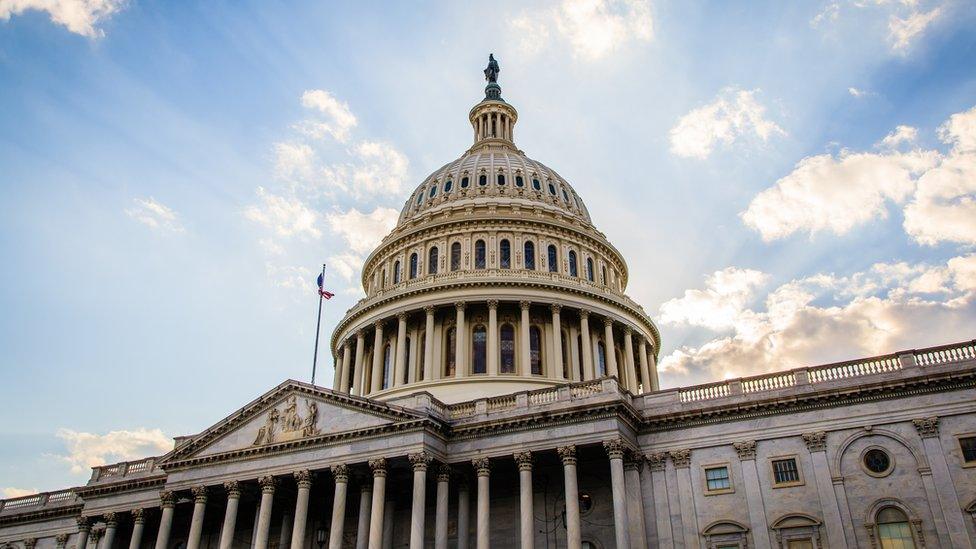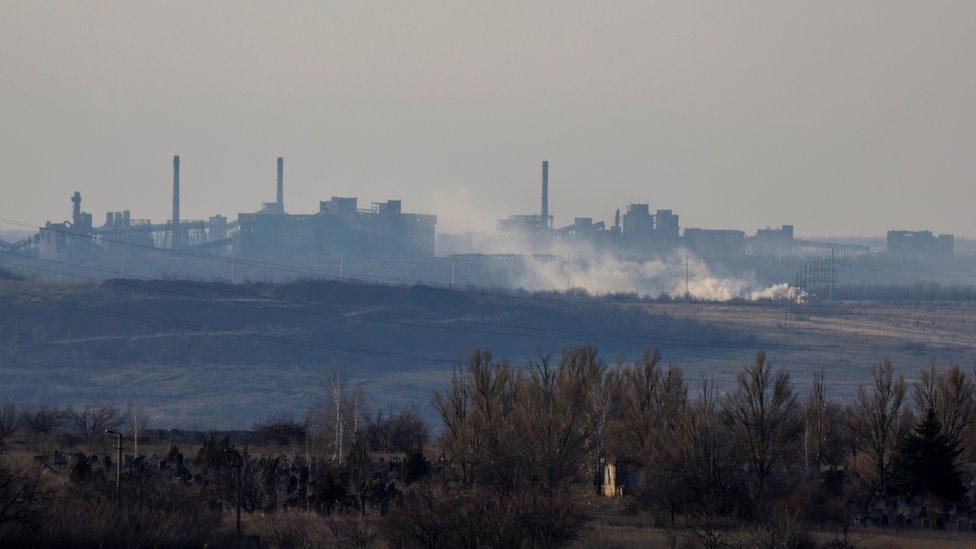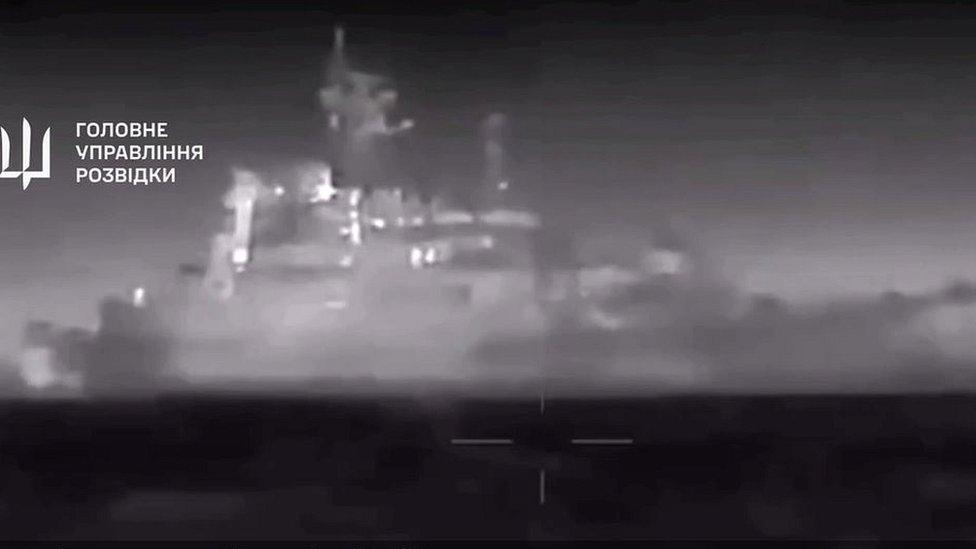Biden condemns House taking break without passing fresh Ukraine aid
- Published

President Joe Biden has said the US House's decision to call a two-week recess without passing fresh aid for Ukraine is "bizarre" and "outrageous".
On Tuesday, the Senate approved funding worth $95bn (£75bn) for Ukraine, Israel and Taiwan in a bipartisan vote.
House Speaker Mike Johnson, a Republican, has said that the lower chamber would not vote on it without additional funding for border security.
Mr Biden said failing to pass new aid could undermine America's reputation.
"I won't say panic, but there is a real concern about the United States being a reliable ally," Mr Biden said angrily during a news conference at the White House.
"It's about time they step up, don't you think? Sitting on a two week vacation? What are they thinking. My God, it's bizarre," he told reporters.
The president's intervention comes after Speaker Johnson effectively killed the Senate approved bill that would have seen $60bn allocated in new aid for the Ukrainian military.
Some 22 Republicans, including Senate Minority Leader Mitch McConnell, joined Democrats in voting to approve the legislation.
Mr Johnson told reporters this week that the proposals failed to address his demands for new funding for the US southern border, and insisted that the House will "work its will" on its own proposals.
"House Republicans were crystal clear from the very beginning of discussions that any so-called national security supplemental legislation must recognise that national security begins at our own border," the Louisiana lawmaker said.
He pulled votes scheduled for Friday with a day's notice, instead announcing a two-week recess. The move appeared to pull the rug from under some members of his own party who had been working to quickly roll out an alternate proposal on Ukraine aid.
The reported death on Friday of Russian opposition leader Alexei Navalny provides additional urgency to calls from for the US to punish Russian President Vladimir Putin by funding the Ukrainian fight against the Russian invasion, and could trigger more negotiations to find a means to end the legislative impasse.
On Friday, while addressing Mr Navalny's reported death, Mr Johnson said Congress would continue to "debate the best way forward to support Ukraine".
"As international leaders are meeting in Munich, we must be clear that Putin will be met with united opposition," he said in a statement.
The political obstacles to congressional passage of an aid package, however, remain significant. By the time the House of Representatives returns from its recess, the spotlight may have shifted from talk of Russian misdeeds to a US government shutdown, which will occur in the first week of March without congressional action.
The US has already approved $44.2bn in military aid for Ukraine, but some members of the Republican party - urged on by former President Donald Trump - have grown increasingly sceptical of further funding.
The pollical gridlock in Washington comes as Ukrainian troops were forced to withdraw from the key eastern city of Avdiivka on Friday because it was surrounded by Russian forces.
Ukraine's Commander-in-Chief Oleksandr Syrskyi said his troops retreated "to avoid encirclement and preserve the lives and health of service personnel".
The town, which has been the scene of intense fighting in recent months, is a strategically important area seen as a gateway to nearby Donetsk, the regional Ukrainian capital seized by Russian-backed fighters in 2014 and later illegitimately annexed by Moscow.
White House National Security Spokesperson John Kirby said on Thursday that the failure by the House to address the need for fresh military aid was contributing to the struggle of Kyiv's troops.
"Because Congress has yet to pass the supplemental bill, we have not been able to provide Ukraine with the artillery shells that they desperately need to disrupt these Russian assaults," Mr Kirby said.
Related topics
- Published14 February 2024

- Published16 February 2024

- Published14 February 2024
